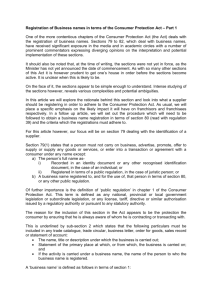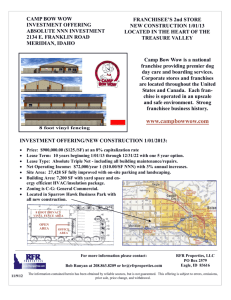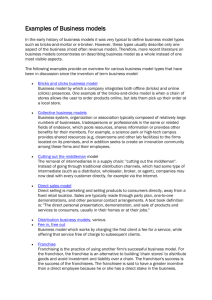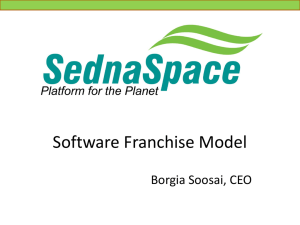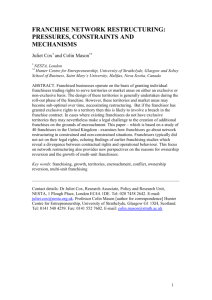Food Trucks and Franchising: A Recipe for Success?
advertisement
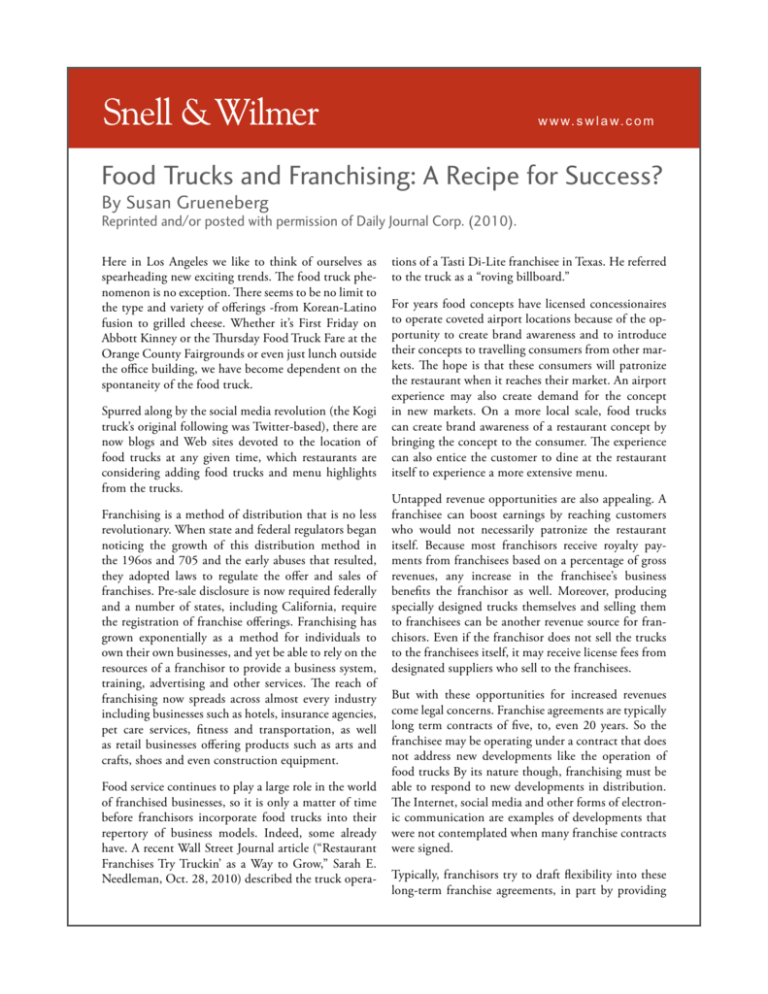
w w w. s w l a w. c o m Food Trucks and Franchising: A Recipe for Success? By Susan Grueneberg Reprinted and/or posted with permission of Daily Journal Corp. (2010). Here in Los Angeles we like to think of ourselves as spearheading new exciting trends. The food truck phenomenon is no exception. There seems to be no limit to the type and variety of offerings -from Korean-Latino fusion to grilled cheese. Whether it’s First Friday on Abbott Kinney or the Thursday Food Truck Fare at the Orange County Fairgrounds or even just lunch outside the office building, we have become dependent on the spontaneity of the food truck. Spurred along by the social media revolution (the Kogi truck’s original following was Twitter-based), there are now blogs and Web sites devoted to the location of food trucks at any given time, which restaurants are considering adding food trucks and menu highlights from the trucks. Franchising is a method of distribution that is no less revolutionary. When state and federal regulators began noticing the growth of this distribution method in the 196os and 705 and the early abuses that resulted, they adopted laws to regulate the offer and sales of franchises. Pre-sale disclosure is now required federally and a number of states, including California, require the registration of franchise offerings. Franchising has grown exponentially as a method for individuals to own their own businesses, and yet be able to rely on the resources of a franchisor to provide a business system, training, advertising and other services. The reach of franchising now spreads across almost every industry including businesses such as hotels, insurance agencies, pet care services, fitness and transportation, as well as retail businesses offering products such as arts and crafts, shoes and even construction equipment. Food service continues to play a large role in the world of franchised businesses, so it is only a matter of time before franchisors incorporate food trucks into their repertory of business models. Indeed, some already have. A recent Wall Street Journal article (“Restaurant Franchises Try Truckin’ as a Way to Grow,” Sarah E. Needleman, Oct. 28, 2010) described the truck opera- tions of a Tasti Di-Lite franchisee in Texas. He referred to the truck as a “roving billboard.” For years food concepts have licensed concessionaires to operate coveted airport locations because of the opportunity to create brand awareness and to introduce their concepts to travelling consumers from other markets. The hope is that these consumers will patronize the restaurant when it reaches their market. An airport experience may also create demand for the concept in new markets. On a more local scale, food trucks can create brand awareness of a restaurant concept by bringing the concept to the consumer. The experience can also entice the customer to dine at the restaurant itself to experience a more extensive menu. Untapped revenue opportunities are also appealing. A franchisee can boost earnings by reaching customers who would not necessarily patronize the restaurant itself. Because most franchisors receive royalty payments from franchisees based on a percentage of gross revenues, any increase in the franchisee’s business benefits the franchisor as well. Moreover, producing specially designed trucks themselves and selling them to franchisees can be another revenue source for franchisors. Even if the franchisor does not sell the trucks to the franchisees itself, it may receive license fees from designated suppliers who sell to the franchisees. But with these opportunities for increased revenues come legal concerns. Franchise agreements are typically long term contracts of five, to, even 20 years. So the franchisee may be operating under a contract that does not address new developments like the operation of food trucks By its nature though, franchising must be able to respond to new developments in distribution. The Internet, social media and other forms of electronic communication are examples of developments that were not contemplated when many franchise contracts were signed. Typically, franchisors try to draft flexibility into these long-term franchise agreements, in part by providing that the franchisor reserves all rights not granted to the franchisee. Territorial protection is a case in point. A franchisee may think he or she has bargained for territorial protection, but the protection is likely to be drafted in terms of restrictions on the placement of additional retail units in the franchisee’s territory. Further, many of these clauses now exempt non-traditional locations -airports, arenas, convention centers, casinos, museums, grocery stores, hospitals, corporate cafeterias and military bases - from the exclusivity grant. This is because the customers in those locations are in closed environments and would be unlikely to leave the location to patronize a franchised unit outside of that environment. But the territorial rights clause is unlikely to mention a development as new as the food truck. In some cases, the franchise agreement may grant the franchisee no territorial rights at all. Does this mean that the franchisor can operate a food truck in the franchisee’s territory, or perhaps worse, franchise a third party to do so? Courts and arbitrators have struggled with these issues before, most recently with the Internet. Typically, franchisee counsel will invoke the implied covenant of good faith and fair dealing to impose a reasonableness standard to evaluate a franchisor’s actions. Meanwhile, franchisor counsel continually strive to draft clear, unambiguous provisions that will preserve the franchisor’s control over new developments. Another tool is the operations manual, which is provided to the franchisee and which the franchisee is required to follow. The operations manual is a living document that the franchisor can modify periodically to respond to changes in the business. Typically, though, it cannot change the fundamental terms of the franchise agreement itself. Even in cases where no territory is granted, franchisors have often responded to these types of issues by forming expansion committees and conducting impact studies before deciding to grant a franchise for a neighboring location. They are likely to employ similar approaches to mobile units like food trucks. Part of the appeal of incorporating food trucks into restaurant operations is the element of creativity that the food truck has. Nimble to respond to customer demand, the food truck also represents an opportunity to participate in temporary events - state and county fairs, 10K runs and relay marathons, swap meets and charity events. Even more spontaneously, a truck can be dispatched to a location where a crowd has assembled: Westwood following a UCLA basketball game, a nightclub where a crowd has gathered, or outside a film festival. If the franchisor sets up a dispatch system to allocate these opportunities among franchisees in a geographic area, is this imposing an additional element of control that may affect the independent contractor status of the franchisee? As farfetched as it sounds, this is a hot button issue in some non-food franchise systems involving dispatching and other methods of work allocation by franchisors. As time goes on the food truck movement will either spread in popularity throughout urban centers, or flicker out as a temporary fad. If its popularity continues and grows, franchise systems are likely to seize this new opportunity, and incorporate trucks as an ancillary distribution method to benefit franchisors and franchisees alike. Susan Grueneberg 213.929.2543 sgrueneberg@swlaw.com Certified as a Franchise & Distribution Law Specialist by the California Board of Legal Specialization. Susan Grueneberg focuses on advising clients on franchise and distribution law, including regulatory compliance. Her practice emphasizes both domestic and international franchises and licensing, as well as area development arrangements and sub-franchises. denver | las vegas | los angeles | los cabos | orange county | phoenix | salt lake city | tucson

